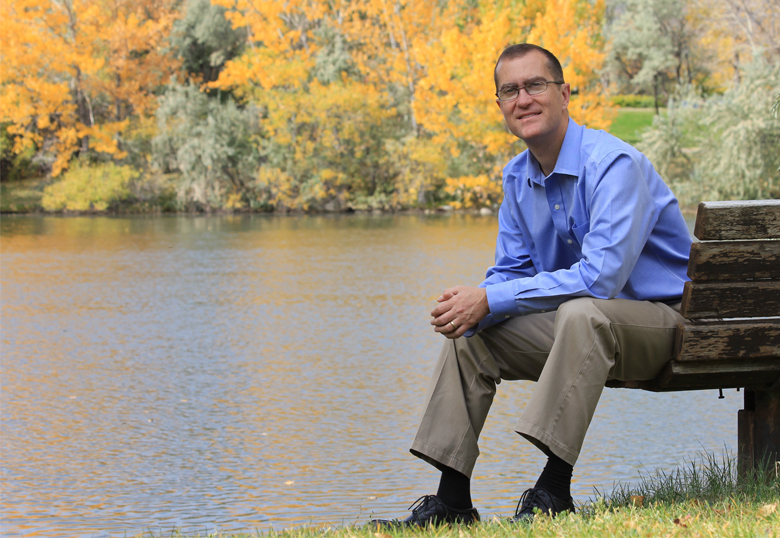University of Lethbridge professor Dr. Paul Hayes has been elected as a Fellow of the Royal Society of Chemistry. This is among the highest honours bestowed to chemists and a first for the University of Lethbridge.
“It’s a humbling group to be a member of,” says Hayes. “I was surprised and honoured. The Royal Society of Chemistry is based in the United Kingdom and it has a very prestigious history that goes back 175 years.”
Fellowship in the Royal Society of Chemistry acknowledges significant achievement by professional chemists and outstanding contributions to the field of chemistry. Nominated from within the administration of the Society, Hayes was notified he was approved for election near the end of August.

“Paul is the first member of our department ever to be elected as a Fellow of the Royal Society of Chemistry. This is a prestigious honour from one of the oldest professional associations in the world and we were very pleased to get this news. Paul has done excellent science at this institution and it is reflected in this recognition,” says Dr. Peter Dibble, Chair of the Department of Chemistry and Biochemistry.
Hayes is a synthetic organometallic chemist, and his work, he says, essentially boils down to designing and making new molecules. He works with compounds that contain both carbon and a metal to try to develop new chemical reactions or new types of molecules for a range of purposes, such as making a new material or developing a new pharmaceutical.
“If you can make a new class of molecule, you’re inevitably going to be able to see new types of reactivity, new types of chemical reactions and then, if you’re clever, you’ll ultimately be able to use that to make different kinds of molecules and do different types of chemistry that haven’t been accessible before,” he says.
Hayes creates new catalysts for various chemical reactions. Using a catalyst means a chemical reaction can be accomplished with less energy and under more mild reaction conditions. Hayes often works with molecules that are generally considered to be unreactive, like methane and nitrogen.
“One of our aims is to functionalize nitrogen into valued-added chemicals such as ammonia, which can be used as fertilizer,” he says. “Approximately one per cent of the world’s energy is used to convert nitrogen to fertilizer — that’s massive. We do this by a high-temperature, high-pressure procedure (the Haber-Bosch process) which is over 100 years old. It’s exceedingly energy intensive.”
Scientists like Hayes work to improve such processes and develop new methods that are more sustainable and environmentally friendly.
Hayes joined the Department of Chemistry in 2006, following the completion of a post-doctoral fellowship at the University of California, Berkeley. He grew up in the Maritimes and did his undergraduate work at Mount Allison University in Sackville, New Brunswick. He came west to do his doctoral degree with Warren Piers at the University of Calgary before going to Berkeley.
When he started looking for a faculty position, only five openings existed and he applied for each one. His second interview was at the U of L.
“I was really impressed with the youth and energy of the department, particularly with their success at getting external funds for large and important pieces of equipment. The access to the facilities was really great and it still is,” he says.
He’s enthusiastically looking forward to the completion of the Destination Project where he’ll gain additional space, allowing him to advance his research at a much greater pace.
Hayes says he wanted to be a scientist before he even knew what that truly meant. Growing up, he loved being outdoors and, when his family spent summer vacations at their cottage in Cape Breton, he was fascinated by the chemical reactions in fireflies, campfires and roasting marshmallows.
“Really, I was always fascinated by chemical reactions and more so as I got older,” he says. “I definitely fit into that category of the mixing and the making. Very early on, I liked to bake and gradually I moved away from things that I could eat to growing crystals or making silly putty or my own fireworks.”
Hayes and his wife, Joanne, are parents to three children, aged seven, four and three.
